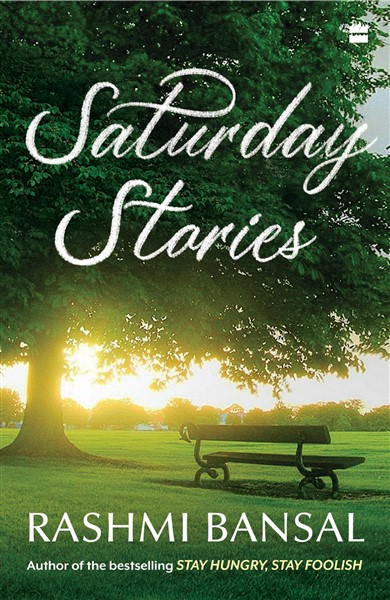An excerpt from Rashmi Bansal’s new collection of deceptively simply but touching stories
Saturday Stories
By Rashmi Bansal
HarperCollins, 176 pages, Rs 250

From the bestselling author of ‘Stay Hungry, Stay Foolish’ and ‘Follow Every Rainbow’, comes a set of sparkling stories that explores the full gamut of human emotions, vulnerabilities and truths, and captures the distinct spirit of our times.
Deceptively simple in their telling, and occasionally laced with dark humour, the short glimpses of life in Rashmi Bansal's first foray into fiction will take readers by surprise, and by turns inspire, move and entertain them. What’s more, each story ends with a QR code that takes the reader to a byte from the author thereby blending the written and the spoken.
Here is one of the stories that will give the reader an idea, a taste of the collection.
Diamonds Are Forever
Meghji Damjibhai Shah was a worried man. As chairman of the Surat Diamond Merchant’s Association, he had faced many tough situations. In any industry, there were always disputes. Between members, with the labour, and sometimes with clients. Meghji had one simple principle in life, which had always served him well.
‘Vyaapar se badhkar vyavhaar’. How you treat people is more important than money.
His mind went back to his first benefactor – a distant uncle, who had visited his native village. Laljibhai was running a small diamond polishing unit; a new business which was growing fast. He offered sixteen-year-old Meghji a job as an apprentice. The boy was thrilled to move to Surat, where life offered many more opportunities compared to Amreli.
Meghji was a quick learner and was determined to become an ace diamond cutter. In a year’s time, he was earning Rs 1,000 per month, most of which he sent home to support the family and pay off long-standing debts. And that was why when his mother brought up the topic of marriage, he was hesitant. Would his wife be willing to live this frugal a life in the big city?
Rakshaben was just the life partner he was hoping for. Not only did she manage the house on his small income, she decided to supplement it as well. As a girl, Raksha had mastered the art of papad-making, which few in the city had time for. She started a small business and, as demand grew, soon enlisted the ladies in the neighbourhood to join her.
A couple of years later, Laljibhai decided to send his nephew to Antwerp. It was an alien world, dealing with the Jewish traders who controlled the diamond business. They did not take kindly to these strange new Indians entering their territory. But the Palanpuri Jains were clever. They picked the smallest diamonds, which no one was willing to cut and polish.
‘Give us a chance to show what is possible,’ said Meghji to prospective buyers in broken English.
One day, Meghji went to show some samples to Rosnovski & Co., one of the biggest in the business. The owner himself inspected a few stones. As he peered through the powerful magnifying glass, Mr Rosnovski snorted and pointed out a flaw. Meghji offered to re-examine each and every stone, and bring a perfect lot the next morning. A painstaking job which took all night.
Impressed by the young man’s attitude, Rosnovski became a trusted client. A few years later, with the blessings (and some capital) from his uncle, Meghji set up his own company. Now, he was running a Rs 5,000-crore empire with the help of his brothers, sons and 3,500 employees, all of whom Meghji considered as ‘family’. Raksha Gems had offices in Antwerp, Mumbai and London.
But, since the last two months, everything had come to a standstill. Coronavirus had shut not just his factory, but all industries in Surat. More than 10 lakh migrant workers were now jobless, and struggling to get two square meals a day. Meghjibhai appealed to the diamond merchant community to open their hearts and their pockets, to donate generously to the cause.
And more than Rs 10 crore were thus collected. A community kitchen was set up and Meghji was personally supervising operations. But they were now facing an unexpected problem.
Working in the hot kitchen in the summer heat was a nightmare. There were not enough tawas, not enough cooks … When he confided in Rakshaben, she simply laughed.
‘Finally you men are understanding what it’s like to work in the kitchen.’
With lightning speed, she sent out a message on various WhatsApp groups. Surely, this would strike a chord …
* * *
Two weeks later
Barkha Dutt reports on a unique model of community kitchen which has taken over Surat, supplying over 1,50,000 hot and fresh chapatis daily.
‘Every housewife in the city is making five extra chapattis to feed migrant workers. I am with Rakshaben, who is masterminding this “work from home” effort …’
Meghji had never been prouder of his wife. For the brightest gems are not in any factory, but right here, in our homes.
[The excerpt reproduced with the permission of the publishers.]


